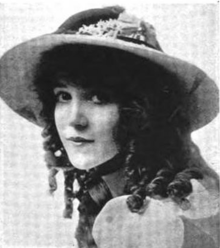Margery Wilson
Margery Wilson (born Sara Barker Strayer) was an American actress, writer, and silent movie director. She appeared in 51 films between 1914 and 1939.
Margery Wilson | |
|---|---|
 | |
| Born | Sara Barker Strayer October 31, 1896 Gracey, Kentucky, USA |
| Died | January 21, 1986 Arcadia, California, USA |
| Occupation | Film director, screenwriter, actress |
Biography
Early life and education
Wilson was born in Gracey, Kentucky. She received higher education in philosophy and literature while also pursuing social service work.
Starting out, Wilson gave public performances in Cincinnati at clubs, schools, and churches. Later, she was able to tour from Ohio to Atlanta with the John Lawrence Players as the leading lady.
By the age of 16, she founded her own theater company. She and her sister left for London on a world tour as musical entertainers.[1]
Film career
In 1914, Wilson traveled to Los Angeles to pursue a career in Hollywood. She was in a wide range of motion pictures but is best known for her portrayal of Brown Eyes, a character D.W. Griffith film Intolerance. She had three dozen roles, many she starred in.[2]
Wilson also was one of Hollywood's earliest woman directors. Her career as a film writer, director, and producer was short, lasting from 1920 to 1922. Those three years did not include the few that she toured with her films. She directed at least three movies: That Something (1920), The Offenders (1921), and Insinuation (1922). There are no surviving prints of any of her directing efforts.[3] She finished her work as a film director by her late 20s.
Later life
Wilson was married more than once and had two children. Both of her children died before she did. She left the film production business to take care of her children after marrying Otto Meeks, the owner of a ranching empire.[4] Although she was no longer in film production, she stayed connected to the business by contributing to pamphlets about famous people. Because of her Hollywood connections, she was able to write 50 of the pamphlets.[5]
Professional achievements
In a 1982 interview, Wilson stated that she did not wish to be called a feminist; however, many who analyzed her work have seen her as such.
She wrote guidance books that coached husbands on how to protect and treat their wives. In 1951, her book How to Make the Most of Wife was published. These books could also be considered inspirational nonfiction. Her autobiography, I Found My Way, was published in 1956.[6] Wilson also authored several inspirational, self-help books for women, including Charm and The Woman You Want to Be.
After her career as a filmmaker, she was a successful speech coach for actors and gave public lectures both on the radio and in person.
Partial filmography
- The Lucky Transfer (1915, short)
- Double Trouble (1915)
- The Primal Lure (1916)
- Eye of the Night (1916)
- Intolerance (1916)
- The Return of Draw Egan (1916)
- A Corner in Colleens (1916)
- The Honorable Algy (1916)
- The Sin Ye Do (1916)
- The Habit of Happiness (1916)
- The Bride of Hate (1917)
- The Gunfighter (1917)
- The Last of the Ingrams (1917)
- The Desert Man (1917)
- Wolf Lowry (1917)
- The Clodhopper (1917)
- The Mother Instinct (1917)
- Mountain Dew (1917)
- Wild Sumac (1917)
- Without Honor (1918)
- The Flames of Chance (1918)
- The Hard Rock Breed (1918)
- The Law of the Great Northwest (1918)
- The Hand at the Window (1918)
- Old Love for New (1918)
- Marked Cards (1918)
- Venus in the East (1919)
- Crooked Straight (1919)
- Desert Gold (1919)
- The Blooming Angel (1920)
- That Something (1920) (actor and co-director)
- The House of Whispers (1920)
- Why Not Marry? (1922)
- Insinuation (1922) (actor and director)
- The Offenders (1922) (actor and co-director)
References
- https://wfpp.cdrs.columbia.edu/pioneer/ccp-margery-wilson/
- "Margery Wilson". The New York Times. The New York Times. Retrieved November 13, 2015.
- Anthony., Slide (1977). Early women directors. South Brunswick [N.J.]: A.S. Barnes. ISBN 049801701X. OCLC 2005395.
- https://wfpp.cdrs.columbia.edu/pioneer/ccp-margery-wilson/
- "Margery Wilson". The New York Times. The New York Times. Retrieved November 13, 2015.
- https://wfpp.cdrs.columbia.edu/pioneer/ccp-margery-wilson/
External links
| Wikimedia Commons has media related to Margery Wilson. |
- Margery Wilson on IMDb
- Margery Wilson at the Women Film Pioneers Project
- Literature on Margery Wilson
- portraits of Margery Wilson photo#1, photo#2, photo#3